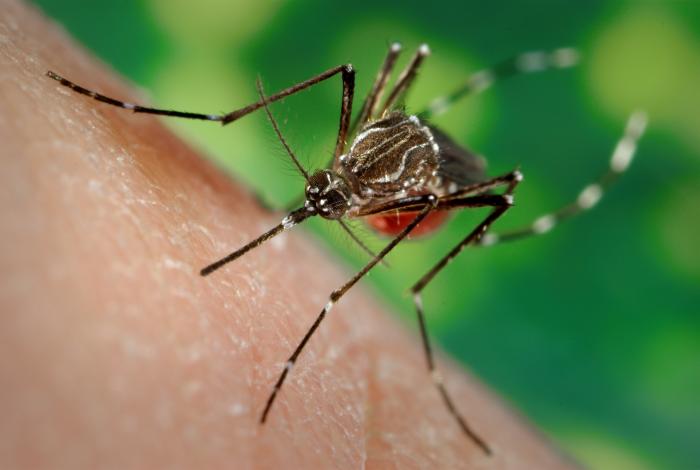Zika Virus
 Aedes aegypti female
Aedes aegypti female
Zika virus is a mosquito-borne flavivirus, transmitted primarily by two species of mosquitoes, Aedes aegypti and Aedes albopictus, both of which are not found in Alaska.
The most common symptoms of Zika virus are fever, rash, joint pain and conjunctivitis, which can occur from 3 to 12 days after exposure. The illness is usually mild, with only one out of five infected people developing symptoms. Symptoms usually last less than one week.
Based on currently available data, the spread of Zika is no longer at the same high levels seen during the main outbreak period in the Americas from 2015 to 2017, and dengue cases now outnumber Zika cases. According to the Centers for Disease Control and Prevention (CDC), the last NAAT confirmed positive case in the U.S. territories was reported in May 2018.
There have been three cases of Zika confirmed either in Alaska residents or by Alaska laboratories; no cases were locally-acquired. In 2007, a case of Zika was confirmed in an Alaskan who traveled to Yap. In July 2016, a non-Alaska resident was diagnosed with Zika while in Alaska. In April 2017, a case was confirmed in an Alaskan who travelled to Central America.
Documents older than 25 months can be found on the State of Alaska Library Archives website.
Arbovirus infections (including Zika) are reportable conditions in Alaska. Providers are reminded to report all suspected Zika infections to the Alaska Section of Epidemiology (SOE) at 907-269-8000.
Laboratory Testing for Zika
The CDC has released NEW Zika and Dengue Testing Guidance for persons living in or with recent travel to active dengue transmission and a risk of Zika (purple area, see map below). For travel or residence in countries who are reporting outbreak of Zika (red area, see map below), please refer back to the MMWR testing guidelines Dengue and Zika Virus Diagnostic Testing for Patients with a Clinically Compatible Illness and Risk for Infection with Both Viruses.
CDC Zika Travel Recommendations Map
Zika virus testing is available at commercial reference laboratories and the Alaska State Public Health Laboratory-Anchorage (ASPHL). Testing at ASPHL must be pre-approved by the Section of Epidemiology: call 907-269-8000.
If you are concerned about Zika and considering getting pregnant, click here.
